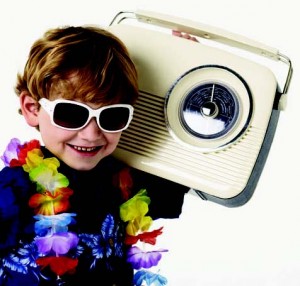Children’s radio: a vital medium
Posted by admin on May 26, 2010 · Leave a Comment
Royal College of Speech & Language Therapists Bulletin, July 2009)
Broadcaster and campaigner Susan Stranks says a new public service radio network for young listeners is necessary to support a Sound Start in life for children
Sir Jim Rose’s Primary Curriculum Review exposes ‘word poverty’ and limited language development in UK children and last year’s Bercow Report on speech, language and communication needs (SLCN) tells a similar story.
This serious and growing problem hinders children’s happy and successful entry into school and social life and limits their future employment.
Rose recommends formal lessons in spoken English to improve articulation, vocabulary and grammar.
In order to talk, understand and express ourselves we must first learn to listen but in today’s predominant screen and keyboard culture we text and send pictures, rather than converse with each other.
A resulting pandemic of ‘lazy listening’ is infecting young and old alike. Listening is crucial in so many important jobs: doctors, politicians, pilots, police,lawyers, teachers and so on – not to mention the need to listen and understand each other on a personal, social and emotional level.
Last month the BBC axed Go4It – the last half hour of children’s radio from its mainstream networks – with its budget going to adult programming.
This is widely condemned as a cut too far but, for years, BBC executives argued that children only wanted television and pop. Occasional children’s programmes of variable quality were shuffled around adult radio networks where they couldn’t be found or wouldn’t be listened to.
The consequence has been a damaging image of this essential component in
children’s culture as unwanted and problematic.
In 2001, the BBC was urged to reserve one of five new digital (DAB) radio networks for children but instead programmed minor slots on adult-speech station, BBC7, where, after seven long years of painful teething, it is still struggling.
It‘s been argued for decades that the neglect of children’s radio would take its toll and, once again, there is a clarion call for its return.
The battle reached the highest level last month, when Members of the House of Lords called for a new public service network for young listeners.
In a debate, led by the Rt Hon Baroness Massey, about the wellbeing of children and families, Baroness Warnock called for children’s radio to be factored into the government’s £40 million Every Child a Talker scheme.
“Nothing is more important to a child’s future wellbeing than confident
communication,” she said. Regretting BBC cut-backs in children’s main-stream programmes, Baroness Walmsley said, “If we are to give children every opportunity to improve their oracy, which must always come before literacy, surely children’s radio must play its part.” (Hansard14/05/09):
Those who say “…kids won’t listen” underline the fact that they have lost the habit through so many years of neglect. Radio may be a handy podcast-platform for the pop industry but it has much more to offer.
The pioneering experiment for London families, abracaDABra!, proved that children welcome radio made especially for them. Parents confirmed that daily listening to stories, songs, rhymes, fun and games encouraged talking, imagination, concentration, memory and, through music and movement, physical coordination. Radio can bring balance to screen and keyboard activity that is frequently blamed for increases in attention disorder; language delay and obesity in the young.
BBC trustees have called for practical partnerships with independent and voluntary organisations to address a public service broadcasting (PSB) funding gap of up to £235million a year and the blueprint for a
children’s radio network in potential partnership with the BBC has been sent to Government; Ofcom; Digital Britain and the BBC Trust and Executive, pending the appointment of a Communication Champion and Communication Council, due this Autumn.
Under the working title ‘Sound Start’ the plan is to establish a PSB service for pre- and primary school children on one of the vacant digital networks to provide daily fun, games, songs and stories for children, together with help and guidance for parents, in a free and accessible form.
The service would pilot alongside the government £52 million programmes Every Child a Talker and the SLCN Action Plan, with an evaluation of radio’s role in children’s play and learning to be published in the National Year of Speech, Language and Communication in 2011-2012
In its Value for Money Studies the BBC Trust promises to examine production costs in radio to ensure best value is being achieved for the £550 million spent each year. At 1p a week per child, radio can support a sound start in life. There can be no better value for PSB money than that.
Susan Stranks coordinates The National Campaign for Children’s Radio and is a member of the ‘Sound Start’ working group, chaired by Baroness Warnock..




